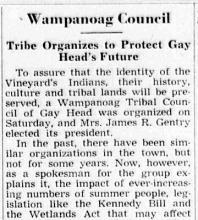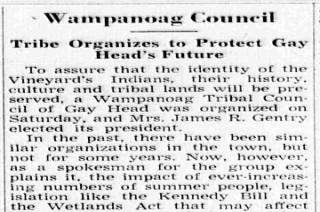To assure that the identity of the Vineyard’s Indians, their history, culture and tribal lands will be preserved, a Wampanoag Tribal Council of Gay Head was organized on Saturday, and Mrs.
Wampanoag history
June 29, 2021
Kate Dario
A new permanent installation at the Aquinnah Wampanoag Indian Museum museum, Our History in Perspective, had its grand opening on Saturday. It details the over 10,000-year history of the Wampanoag people on the Vineyard.
1987
February 12, 1987
The federal government Wednesday recognized the tribal status of the Gay Head Wampanoag Indians in a historic decision that opens the way to settlement of the bitter, 12-year-old land claim dispute.
1983
November 25, 1983
The Wampanoag Tribal Council, the Gay Head Taxpayers Association, the Commonwealth of Massachusetts and the town of Gay Head signed formal settlement papers in the Indian land claim suit last weekend.
The signings represent a major step toward final accord in the suit that has divided the town for nine years.
1972
November 10, 1972
To assure that the identity of the Vineyard’s Indians, their history, culture and tribal lands will be preserved, a Wampanoag Tribal Council of Gay Head was organized on Saturday, and Mrs. James R. Gentry elected its president.
1970
November 13, 1970
A national day of mourning is to be observed by Indians from all parts of the country at Plymouth on Thanksgiving Day, with Gay Head’s Indians - members of the Wampanoag tribe - among those serving as hosts. The solemn two-day event will begin the night before Thanksgiving at the Bourne High School and will continue until mid-afternoon Thursday, in Plymouth, when the annual Pilgrim Parade is scheduled to begin.
1960
May 6, 1960
In the ever-present condition of change among things and men, the name of Chappaquansett seems doomed to be forgotten, though once frequently heard the length and breadth of the Island. For few people mention today the Indian name of that curious, low area that lies between West Chop and Makonikey along the Sound shore.
True, the character of the place has greatly changed through the centuries and even through the past few generations. There are no more farms such as the early Vineyarders knew, and the encampments of Indians had disappeared long before that.
1947
January 14, 1947
“Yea, those of the Isles of Capawack sent to make friendship.” With these words, Governor Bradford, recording in his history, “Of Plimouth Plantation”, a moral triumph over the surrounding savages, singles out for mention by name the most dreaded tribe under Massasoit, Sachem of the Warmanoag, of southern Massachusetts.






